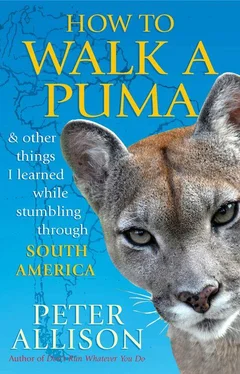Eyelash viper/fer-de-lance/bushmaster: These three snakes had all been seen in the area. The eyelash viper is known to be moody—perhaps because it has no hair, let alone lashes (in spite of its name). Those are horns above its eyes— because it is the devil . I’d never seen one, but that didn’t mean there wasn’t one in my tent. The fer-de-lance, meanwhile, has a cross on the back of its head, like a pirate flag without the skull; I presume evolution is working on correcting that omission. And even Roy was afraid of bushmasters: once he saw one outside his cage and refused to come out for the rest of the day. They are pure evil with scales.
Jaguar: Now that would be deliciously ironic, wouldn’t it?
Puma: Yes, getting bitten by a puma a week before leaving South America would bookend my trip quite neatly, but I’ve never liked bookends.
Tagaeri: The number of animals and large birds has increased dramatically in this area since Otobo’s clan decided not to hunt here (a decision made in the hope of attracting more tourists). Their abundance might attract the Huaorani’s cousins the Tagaeri, though hopefully not in the next two days. Nobody could tell me the likelihood of seeing Tagaeri, as when discussing the tribe’s numbers even expert anthropologists become Huaorani and grab a figure from the air. ‘One hundred! No, three hundred! One thousand!’ Who knew? But I had my spear just in case. Oh goody.
Taromenane: This most mysterious of uncontacted tribes might not even exist, according to some anthropologists (who may be funded by the oil companies seeking to justify their exploration of the area). But their purported nonexistence was no good to me if they didn’t know about it.
Peccaries: Being killed by a peccary would be the most dignity-stripping of the above options, but was still quite possible. If they caught me off guard and felt the need to avenge the deaths of their brethren at Omagewe’s spear tip, I could be slashed and gored to death. Luckily they smell like a wrestler’s armpit so I should be able to detect them coming.
And with those pleasant thoughts, I lay down a while. That night I resolved to keep a watchful if bleary eye open for a jaguar, and whatever else might come to my home sweet temporary home.
As darkness fell, I initially found my isolation unnerving. I imagined footsteps (which were probably just leaves falling from trees) and heard breathing (it was my own), so at one point I got up to face it all, grabbed the torch and went for a brief night walk before my nerve failed and I returned to the tent. I didn’t see anything noteworthy, and this reassured me enough to drop into a refreshing sleep, from which I awoke every few hours. Each time I woke I shone my torch outside to check for jaguars, or Taromenane, but none appeared. There was always the next night though.
•
On the afternoon of the next day I’d been sitting, concealed, for some time (hours? I had no way of knowing) as parrot species, ranging from enormous macaws to tiny leaf-green parrotlets, all gathered, inching their way closer to the lick, building the nerve to flutter in and get the nutrients they needed from the clay. They were wary of predators, who knew this was a daily ritual; any branch could hide a viper, every shadow some lethal cat.
The parrots were very close to the lick when they erupted into a cacophony of squawks and a shower of fear-induced defecation, the sky filling with colour as hundreds of birds wheeled away. Seconds later a hawk arrowed through with something clutched in its talons—something green, red, and redder still where the twitching body had been pierced.
I never like to see any animals die but I have learnt not to flinch from the reality of nature. In cities we react with abhorrence to any sort of violence, as if blood and death were unnatural, but the animal kingdom shows us otherwise. Maybe that was why I had started laughing during the mugging, a revolutionary moment after too many sanitised experiences. ‘Here it is!’ I thought. ‘This is the real stuff! This is life!’ While I’m no fan of conflict, a complete absence of it can also dull humans to the pain of others, as suffering seems only to be on television, and as real as anything else you see there. I’d felt this myself in Sydney, where I had found myself complaining about the most petty of inconveniences as if they were genuine setbacks. On my return to Sydney in 2002, people often asked me what it was like coming back to ‘the real world’ after so long in the bush. But this was the real world, and a lack of exposure to the blood and guts of living felt like hiding from reality.
Despite all the talk of spearing, the Huaorani aren’t violent people. They only kill when the situation demands it. Noting that Huaorani men are built like wrestlers, I had asked Otobo one day about their approach to fighting. He shook his head adamantly. ‘No. Huaorani don’t like to fight at all! If there is a real problem with someone we just spear them …’
•
As my second day at the salt lick drew to a close, I checked that my testicles were still present (they were), urged them to contribute some bravery, and dashed along a path as far as I could before darkness hit, so that I was forced to walk a long way back. Again I saw nothing worth reporting, and yet it remains one of the most frightening things I have ever done. I realised how often I put on a brave face when with others, sometimes for them, so my company wouldn’t feel scared. Yet, alone on that walk, I had regressed to the boy scared to take the garbage out at night because who knew what monsters lurked along the garden path?
My last night alone in the jungle was also most likely my last good chance to see a jaguar. It was still possible that one would cross my path in the two days I would spend back with the Huaorani before Otobo took me back to Coca, but most jaguars would be too canny for such an encounter. (The last jaguar seen near the villages was six months before my visit; Omagewe speared it because it was eating his chickens.) All this ran through my mind as Otobo came to fetch me in his canoe, and take me back to Boanamo.
•
Perspective is such a fickle thing. I was back at Otobo’s village, which felt city-sized and bustling after three days alone. On my first day back at Otobo’s village his wife prepared an enormous meal which included paca (a rodent slightly larger than a rabbit). Out here food is valued, treasured even, but there is no refrigeration so when something is abundantly available the people gorge. To begin with I had been eating Western food that had been brought in from Coca, but when this ran out I began eating mostly traditional food with the Huaorani. This included paca and a type of caterpillar; eventually the peccary that had gored Omagewe turned up on my plate.
While I ate the welcome-home feast I watched Otobo’s older daughter playing with what I thought at first was some sort of ragdoll, before I realised it was the baby of the paca we were eating for dinner. Although the small rodent was quite dead, the little girl cooed over it, even wrapping it in a blanket at one point. Later, after one of the dogs had stolen it, she treated a bottle of cooking oil the same way, showing certain instincts are global.
Once dinner was over, the clan piled into a canoe for the short paddle to Omagewe’s hut, leaving me alone again. This was their life as they would live it whether I was there or not: some chores, some family time, lots of laughter.
Everyone I have spoken to about the Huaorani believes they will be dragged into our modern world one way or another, and soon; there are any number of groups that want to adopt and help them through the process. But if you asked any parent what they want for their child the first thing they would say is ‘happiness’. I have no idea what anyone can teach the Huaorani about that.
Читать дальше












